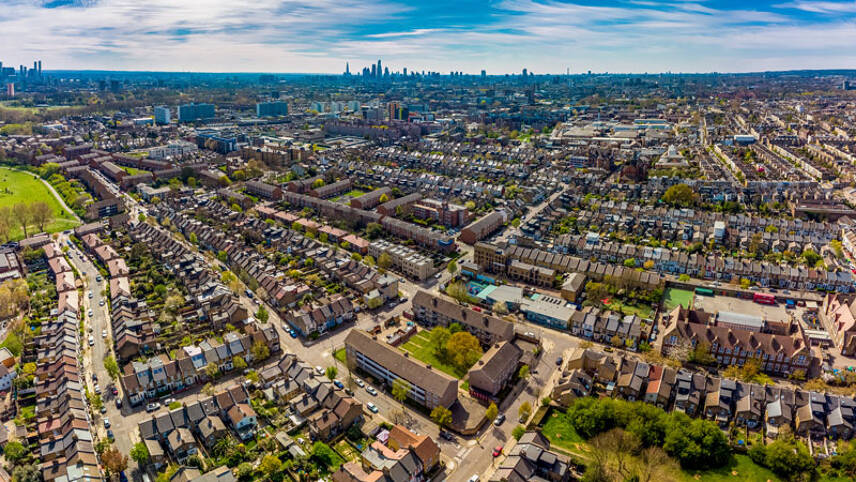Register for free and continue reading
Join our growing army of changemakers and get unlimited access to our premium content

Pictured: Homes in Hackney
That is according to a new briefing from business group BusinessLDN, which convenes companies, academic organisations, housing associations and business improvement districts across the capital.
Members include Grosvenor Property UK, Landsec, Cadogan, British Land, Clarion Housing Group and Berkeley Group.
The briefing, supported by the Green Finance Institute, assesses the interventions that would be needed if Greater London is to reach its ambition of all homes meeting Energy Performance Certificate (EPC) grade ‘B’ or higher by 2030.
It notes that achieving this vision would provide a major economic boost for the capital, of a total of £110bn. This would be largely due to the creation of tens of thousands of jobs in retrofitting and in the supply chains for products such as insulation or double/triple-glazed windows.
According to the briefing, it will be challenging to meet the target without the devolution of additional powers to local authorities, coupled with more dedicated resourcing and training for councils.
While money from the Government and Greater London Authority (GLA) will be key, private sector investment will also be crucial, the document emphasises. But, at the moment, there is a dearth of financing solutions covering whole communities which are, therefore, large enough to be attractive to many investors. The paper calls for innovation here from councils in partnership with the GLA and finance firms.
The money will only be able to be spent effectively if there is a strong base of skilled workers to deliver projects. A lack of workers able to undertake accredited projects was notably cited by the UK Government as a key cause of the failure of the Green Homes Grant.
The briefing recommends an industry-funded recruitment campaign across London to attract diverse talent and close skills gaps – present and impending. It also implores the Government to fast-track the development of new apprenticeship standards for retrofits.
Getting households on-side
BusinessLDN’s paper acknowledges that, ultimately, homeowners and landlords will make their own decisions about how and when to retrofit their homes. It sets out a package of interventions that could better inform and encourage them to do so.
The first is the launch of a London-wide awareness campaign spearheaded by the GLA and Energy Saving Trust. This would help to sell retrofit as an opportunity to reduce energy bills and improve home comfort.
The campaign should be coupled with an accredited ‘one-stop-shop’ for advice, which London residents should be able to access for free to gain expert guidance at any stage of the retrofitting process.
It is acknowledged that, in the current cost-of-living crisis, a key barrier for many homes will be not a lack of information but worries about the upfront cost and likely financial benefits of retrofitting.
The paper recommends that Stamp Duty is adjusted based on a property’s EPC rating. As such, those who buy a home and then retrofit it within two years would be eligible from a Stamp Duty rebate.
Banks can also play their part by launching tailored financing mechanisms such as green mortgages, which offer favourable rates for energy-efficient properties.
BusinessLDN’s deputy chief executive Muniya Barua said: “At a time when the capital is facing a cost-of-living squeeze, retrofitting can help Londoners cut their energy bills while also helping the environment and economy.
“Homeowners seeking to make their homes more energy efficient face a maze of complex process, confusing regulation and high upfront costs. That’s why we’re calling for a bold package of measures to encourage more homeowners to take the plunge.”
Great British Insulation Scheme
Last month saw the UK Government setting aside £1bn for a new home insulation scheme, which it hopes will provide financial support to more than 300,000 properties.
The Great British Insulation Scheme will provide grant funding to homes in England, Scotland and Wales with an Energy Performance Certificate (EPC) rating of D or lower. The UK Government is notably aiming for all homes to have EPC ratings of C or higher by 2035.
A few weeks later, a report co-authored by Net-Zero Review author Chris Skidmore MP and green building expert Simon McWhirter made the case for the Government to target a 30% reduction in energy demand in buildings by 2035, against a 2021 baseline. At present, it is only targeting a 15% reduction.
This report recommended interventions going above and beyond those covered by the Great British Insulation scheme.


Please login or Register to leave a comment.